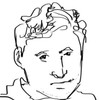All photos by Lacey Terrell. Courtesy of HBO
Advertisement
Advertisement
Advertisement
Rachel McAdams and Taylor Kitsch, wearing their Acting Faces
Advertisement
That he has had to do all of this while wearing a bolo tie and sporting a mustache so thick it could filter an Irish coffee is admirable, if not superhuman.Farrell's character seems to be Pizzolatto's primary vessel for proving that life is cold, and only the coldest—those who are willing to assault a man because his kid shit in a pair of Nikes (or cut them up, whatever)—get to wear this wind-beaten leather jacket we call manhood. By episode two, Farrell's ex-wife is straight up telling him, "You're a bad man." When Farrell visits his ex-cop turned pothead dad, watches a John Wayne movie with him, and then fishes his dad's old police badge out of the trash, it doesn't take a false detective, let alone a true one, to recognize that Pizzolatto is waving some gigantic flags full of symbolism in our faces."ASS-pen."
"You ever bully or hurt anyone again, I'll come back and butt-fuck your father with your mom's headless corpse on this goddamn lawn."
"Maybe it's just a little too close to sucking a robot's dick."
"I support feminism. Mostly by having body-image issues."
"Twelve years old my ass. Fuck you!"
"And what? What? Shit in 'em?"
"A good beating promotes personal growth."
"Booze tends to take the edge off. I wanna stay angry."
"I ain't ever exactly been Colombo."
Advertisement
